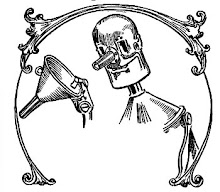I was glad that video showed up on TED, so that I could get this article series started off on the right foot. Since I normally like to put mine in my mouth, I figured I would let someone better than I kick it off.
The point I would like to discuss mostly is the future of interactive media as art. I liked what Scott was talking about when he demonstrated the various new forms comics can take alongside the older models of presentation. What he doesn't talk about though, are video games (probably since he is a comic book artist, but the ideas cross pollinate well.)
This debate has been raging since the first games showed up. The resistance to the idea of new media being inconceivable as art is nothing novel or unique. Just look at the birth of movies to see that at one time, they too were thought to be nothing more than a cheap thrill, a gimmick to appease and amuse.
But times change, and today many films are considered masterpieces not just by the viewing public, but by those who study the evolution of the medium itself. This trend is indicative of all things in human society (and nature at large): opinions change, evolve, and take in new facts as they become available.
The question becomes, then, why? Why so much resistance? From where I am sitting it breaks into three subjects: changing societal views, evolving technology, and application of the medium.
Application of the medium is the most broad of the categories, so we can address it first. Basically, what it boils down to, is how the creators are using their tools to express whatever it is they are trying to convey. In video games, like most long visual media, the point is usually less to express a single emotion, and more to invest the viewer emotionally in a story.
Movies accomplish this by exposing the character's flaws, interests, and objectives to us in order to help us identify with them. Books do it in a similar method, but give us the added bonus of at times having access to the thoughts of not only the hero, but also the villain, as well as world based information and the ability for long expanses of time to pass in a few pages. Our relationship with the character in a book is often slower to develop than it would in a movie.
Video games on the other hand have the unique ability, if applied properly, to invest the player on a more basic level of including interactivity. This immediately invests the player emotionally since they are essentially responsible for the success or failure of the character they are playing. Therefore, through application of lighting, mood, setting, you have increased your viewing willingness to receive what it is you are trying to tell them.
Now the question becomes: Do you have anything to say to them? This is where games depart from movies just slightly and enter into book territory. The story in a game is often told through a combination of narrative, dialogue, and the emotional investment of the player throughout their play time. Are they aggressive? Passive? Do they read each line of text or listen to every cut scene? Do they skip right to the action? Do they ignore story and action both for a while and just play with their environment?
This is where we get into uniquely game territory, and where the real art comes in. Choices matter in a lot of games, especially with regards to modern and roleplaying games. How a developer implements these choices reflects on the project itself. Some questions have to be answered early, such as: "Am I telling a linear story, or a tale of many paths? Is this a sandbox, or an alley?" Now, I have presented these as either/or statements, and that is oversimplifying the issue to say the least. The best of these games combine both sides to create a unique interactive piece of art that has the staying power of any movie.
That is where I will suspend this now, I will continue when I return from my trip. Until then, think over this (if it isn't a giant rambling mess, I lost my notes and outline) and I will resume writing on Saturday if all goes well.
Thursday, January 15, 2009
Visions of the Future: The Digital Age
Labels:
art,
books,
looking ahead,
movies,
the future,
videogames,
videos,
VotF
Subscribe to:
Post Comments (Atom)




No comments:
Post a Comment